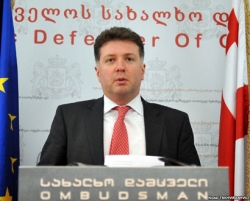Information Center of Kakheti
Public Defender published the results of the monitoring carried out in the children’s institutions in December of 2011. The monitoring revealed the cases when nurses lashed, beat children with bottles, chairs, sticks; a child left without attention chopped his finger off by axe.
The monitoring was carried out in 13 large and in 17 small family-type orphanages. The monitors studied how the rights of beneficiaries were protected in the institutions.
The results of the December 2011 monitoring demonstrated that despite many violations, the child’s rights are better protected in certain directions than they were in previous years. It is clear that monitoring revealed several problematic issues which are reflected in the report in details with relevant recommendations in order to make the protection of beneficiaries’ rights compliant with national and international laws,” the statement of the Public Defender’s Office reads.
The monitoring revealed systemic and individual violations in both large and small orphanages:
Ill-treatment of children, serious facts of physical and emotional violence and negligence; in particular case the institution had to immediately separate the violator and victim to avoid the problem;
The personnel use various forms of punishment against children; lashing, beating them with bottles, making children stand in the corner, seizing new clothes from beneficiaries, shaking, making children implement physical job as a method of punishment, etc.
In large orphanages children became victims of oppression and emotional violence because of their cooperation with human rights defenders.
In public schools, children lacking parental care are subjected to degrading treatment and in several cases they are even punished: by beating with stick, chair, lash, finger-ring, pulling hair, etc.
Children with unbalanced behavior and possible psychic problems are expelled from orphanages without proper medical and social assistance because the institution cannot ensure relevant care for similar children; the monitoring group members still do not know the conditions and whereabouts of several similar beneficiaries.
Violations in large orphanages: a child left without attention chopped his finger off by axe.
Several hundreds of children lacking parental care are not under state control and no state institution had information about those children by October of 2011 though the law obliges the state to take care of them.
Beneficiaries of large orphanages beg in the streets and their anti-social activities are not controlled by responsible institutions.
Haste in deinstitutionalization process and improper preparation for the reforms resulted into psychological traumas of deinstitutionalized children and hindered adaptation process in alternative care institutions;
Reintegration of children in unreliable environment where adequate living conditions are not ensured;
Improper living conditions for the children’s development in several family-type orphanages; unrepaired and damp rooms, cold, damaged furniture;
Unarranged medical documents and shortcomings in adequate medical service of children.
It is noteworthy that the Report also highlights the hard conditions in government-controlled orphanages. The special prevention group learned that Georgian Orthodox Church has opened three asylums in Georgia whose beneficiaries are about 300 children lacking parental care; however, government institutions are not monitoring the situation in those asylums to find out how children’s rights are protected there; the Ministry of Labor, Healthcare and Social Welfare of Georgia does not have information about those orphanages and their beneficiaries though the institutions receive funds from the state budget; the state does not supervise how the service provided to beneficiaries meets the standards in those institutions.
Having finished the monitoring during the report period, the Public Defender of Georgia sent 58 recommendations to corresponding state institutions. The Ombudsman’s office states that those institutions either completely or partly executed one part of the Public Defender’s recommendations.
The Public Defender hopes the state institutions, who are authorized to protect the children lacking parental care and to create honorable living conditions for them, will again carefully study the report and envisage the Ombudsman’s recommendations.




